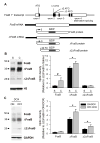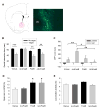Functional role of the N-terminal domain of ΔFosB in response to stress and drugs of abuse
- PMID: 25313003
- PMCID: PMC4268105
- DOI: 10.1016/j.neuroscience.2014.10.002
Functional role of the N-terminal domain of ΔFosB in response to stress and drugs of abuse
Abstract
Previous work has implicated the transcription factor, ΔFosB, acting in the nucleus accumbens, in mediating the pro-rewarding effects of drugs of abuse such as cocaine as well as in mediating resilience to chronic social stress. However, the transgenic and viral gene transfer models used to establish these ΔFosB phenotypes express, in addition to ΔFosB, an alternative translation product of ΔFosB mRNA, termed Δ2ΔFosB, which lacks the N-terminal 78 aa present in ΔFosB. To study the possible contribution of Δ2ΔFosB to these drug and stress phenotypes, we prepared a viral vector that overexpresses a point mutant form of ΔFosB mRNA which cannot undergo alternative translation as well as a vector that overexpresses Δ2ΔFosB alone. Our results show that the mutant form of ΔFosB, when overexpressed in the nucleus accumbens, reproduces the enhancement of reward and of resilience seen with our earlier models, with no effects seen for Δ2ΔFosB. Overexpression of full length FosB, the other major product of the FosB gene, also has no effect. These findings confirm the unique role of ΔFosB in the nucleus accumbens in controlling responses to drugs of abuse and stress.
Keywords: FosB; cocaine; social defeat stress; viral-mediated gene transfer; Δ2ΔFosB; ΔFosB.
Copyright © 2014 IBRO. Published by Elsevier Ltd. All rights reserved.
Figures



References
-
- Berton O, McClung CA, DiLeone RJ, Krishnan V, Russo S, Graham D, Tsankova NM, Bolanos CA, Rios M, Monteggia LM, Self DW, Nestler EJ. Essential role of BDNF in the mesolimbic dopamine pathway in social defeat stress. Science. 2006;311:864–868. - PubMed
-
- Carle TL, Ohnishi YN, Ohnishi YH, Alibhai IN, Wilkinson MB, Kumar A, Nestler EJ. Absence of conserved C-terminal degron domain contributes to ΔFosB’s unique stability. Eur J Neurosci. 2007;25:3009–3019. - PubMed
Publication types
MeSH terms
Substances
Grants and funding
LinkOut - more resources
Full Text Sources
Other Literature Sources
Medical
Molecular Biology Databases
Miscellaneous

